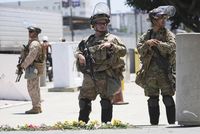In recent weeks, Los Angeles has found itself at the center of a national storm over immigration enforcement, as federal agents, National Guard troops, and local officials clash over the boundaries of law, compassion, and community safety. The city’s immigrant families, particularly those of Latinx descent, are living through a period marked by fear, legal uncertainty, and public outcry—one that has drawn in voices from across the cultural and political spectrum, from hip-hop icons to state governors.
On August 7, 2025, rapper Ice Cube took to the airwaves of REAL 92.3 LA’s The Cruz Show to voice his deep frustration and concern over the ongoing United States Immigration and Customs Enforcement (ICE) raids sweeping through his hometown. According to Billboard, Cube did not mince words, describing the federal government’s tactics as “heavy-handed” and “disrespectful,” especially as reports surfaced of agents conducting raids at churches, weddings, and schools. “It hurts, because it’s all kind of different situations been going around, as far as immigration,” he told listeners. “To see people disrespected like that, and federal government just being too heavy-handed and disrespectful, going to churches and weddings and grabbing people out of those schools... It’s like, ‘Come on man, y’all just overdoing it.’”
Cube’s comments encapsulated the anxiety gripping the city’s Latino community, which, he argued, was being deliberately traumatized. “Nobody’s safe, man,” he lamented. “They don’t care who they grab. It’s sad. They come in and disrespect everybody. They want to traumatize people, too.” He added, “It’s just sad, man. I can’t wait ’til this period is over. I don’t know how we’re going to get to the end, but it’s crazy to see people dragged out of their spots of refuge.”
His interview came as protests continued to erupt across Los Angeles, sparked by President Donald Trump’s mass deportation drive in June. The administration’s controversial decision to deploy the National Guard to assist ICE operations, despite the objections of city and state officials, only intensified the unrest. According to a July Pentagon announcement cited by USA Today, approximately 1,700 National Guard troops were being tapped to provide “case management, transportation and logistical support, and clerical support for the in- and out-processing” of ICE arrests. A defense official explained that these duties included taking fingerprints, photographs, and DNA swabs of detainees—tasks that, in the eyes of many critics, blurred the line between military and law enforcement roles.
This deployment wasn’t limited to California. As of August 8, 2025, more than a dozen Republican governors had sent their state National Guard units to bolster ICE’s ranks, staffing facilities and helping process arrests. The legal justification for this move hinged on Title 32 of the U.S. Code, which allows governors to activate their own guard members for federal missions while maintaining a veneer of state control. The Trump administration, meanwhile, continued to battle California in court over the Posse Comitatus Act, which generally prohibits military involvement in domestic law enforcement. But for red state governors, the legal nuances seemed less important than demonstrating solidarity with the White House’s agenda.
One such state was Tennessee, where Governor Bill Lee’s office announced on August 8 that its National Guard had been mobilized under Title 32 status to assist with President Trump’s deportation plan. As reported by FOX13 Memphis, Lee’s office stated: “As Gov. Lee has said many times, Tennessee stands ready to support President Trump’s efforts to secure our Nation’s borders and remove the most violent criminals from our streets. In response to the U.S. Department of Homeland Security’s request for assistance, the Governor authorized Tennessee National Guardsmen under Title 32 status to assist with administrative and clerical duties at Immigration and Customs Enforcement (ICE) processing facilities within the state. These service members will assist with tasks including data entry, case management, and logistical support.”
This wasn’t Tennessee’s first foray into aiding ICE. Back in May, Governor Lee had ordered the Tennessee Highway Patrol to help ICE carry out mass traffic stops in Hispanic neighborhoods of Nashville, a move that drew sharp criticism from immigrant advocates and civil liberties groups.
Meanwhile, the legal landscape in California was shifting rapidly. On July 11, U.S. District Judge Maame Ewusi-Mensah Frimpong issued an order limiting ICE’s ability to conduct so-called “roving” raids in Los Angeles. The order barred agents from making arrests based solely on broad criteria like speaking Spanish or gathering at locations frequented by day laborers, requiring instead individualized evidence of immigration violations. The 9th Circuit Court of Appeals upheld the order, even grilling Trump administration lawyers about allegations of a White House-mandated quota to arrest 3,000 immigrants per day—a charge the administration denied, despite public comments by White House adviser Stephen Miller suggesting otherwise.
Unwilling to accept these restrictions, the Justice Department filed an emergency appeal to the Supreme Court on August 7. Solicitor General John Sauer argued that factors such as language proficiency or field of employment could “heighten the likelihood that someone is unlawfully present in the United States” and should be considered valid grounds for enforcement. He described the judge’s order as “a straitjacket” for law enforcement and claimed it “defies” Supreme Court precedent.
But as the legal wrangling continued, so did the raids. On August 6, ICE agents were filmed jumping out of a rented Penske truck at a Home Depot in Los Angeles, arresting several Latino men—a scene that, according to the Associated Press, was part of an operation officials dubbed “Operation Trojan Horse.” The Penske Corporation, upon learning of the incident, issued a statement clarifying that it strictly prohibits the transportation of people in the cargo area of its vehicles and had not authorized its trucks for such use. The American Civil Liberties Union (ACLU), which had filed the lawsuit leading to Judge Frimpong’s order, announced it was investigating whether the federal government had violated the court’s restrictions.
All the while, the Trump administration faced mounting challenges staffing its immigration enforcement apparatus. As reported in multiple outlets, the Department of Homeland Security struggled to recruit enough personnel, resorting to dropping age restrictions and offering large bonuses to lure retired employees back into service. Critics argued that the reliance on National Guard troops was not just a stopgap, but an attempt to normalize military involvement in immigration enforcement—a development that many civil rights advocates warned could have lasting consequences for American democracy.
As the summer of 2025 wears on, the future of immigration enforcement in Los Angeles and beyond remains fiercely contested. For families caught in the crossfire, for artists like Ice Cube speaking out, and for the officials on both sides of the legal and political divide, the stakes could not be higher. Every new raid, court order, and public protest adds another layer to a story that is far from over.


